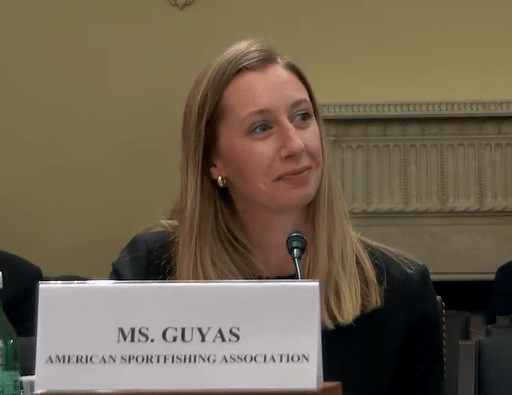ASA Southeast Fisheries Policy Director Martha Guyas highlighted key issues affecting saltwater recreational fishing in the southeast
 Yesterday, the American Sportfishing Association’s (ASA) Southeast Fisheries Policy Director, Martha Guyas, testified on the importance of sound fisheries policy before the U.S. House Committee on Natural Resources Subcommittee on Water, Wildlife and Fisheries.
Yesterday, the American Sportfishing Association’s (ASA) Southeast Fisheries Policy Director, Martha Guyas, testified on the importance of sound fisheries policy before the U.S. House Committee on Natural Resources Subcommittee on Water, Wildlife and Fisheries.
The oversight hearing, titled, “Benefits and Access: The Necessity for Multiple Use of Water on Resources,” included discussion on the multiple needs and benefits of water resources throughout the United States, including fishing and fishery-related topics. Guyas began by showcasing the various ways that fishing benefits conservation, jobs and the U.S. economy.
“In 2021, 52.4 million people went fishing in the U.S., supporting 826,000 jobs and contributing $129 billion to the economy,” said Guyas. “Through fishing license purchases, excise taxes and direct donations, the recreational fishing community contributes approximately $1.7 billion toward aquatic resource conservation each year. I am confident in saying that no other user group contributes nearly as much toward ensuring our nation’s waterways and fisheries are healthy and accessible to the public.”
Guyas continued her testimony by focusing on four key issues relating to fishery access and conservation in the southeastern United States: Gulf Red Snapper, South Atlantic Red Snapper, North Atlantic Right Whale Speed Vessel Restrictions and Shark Depredation.
Martha’s testimony begins at 44:49.
On Gulf Red Snapper, Guyas noted that while state management has led to greater recreational access, and recent science has found red snapper to be three times more abundant than previously thought, challenges remain. Several states are facing significant catch limit reductions due to discrepancies between state and federal catch estimates, and overall catch limits have not meaningfully improved despite our better understanding of red snapper abundance.
After switching to South Atlantic Red Snapper issues, Guyas mentioned that while rebuilding the Atlantic red snapper fishery is a success story, managers have still not provided reasonable harvest opportunities for anglers. According to Guyas, “Questions have been raised by the SAFMC, scientists, and the public about whether the data and assumed reference points in the stock assessment are leading us to the wrong conclusion about this fishery being overfished and undergoing overfishing.”
When the hearing highlighted NOAA’s 10-knot vessel speed restriction to attempt and protect the North Atlantic Right Whale, Guyas noted how the slower travel may cause anglers to cancel fishing trips and that while ASA supports efforts to protect whales, this rule was rushed through by NOAA and is significantly flawed. Guyas noted, “Right whales deserve better protection, but vast, blanket speed restrictions that are not based on the best available science are not the solution.”
The final issue highlighted by Guyas was shark depredation, which occurs when a shark eats or damages a hooked fish prior to the fish being landed. Guyas highlighted ASA’s position on the management of shark depredation, noting, “We support a variety of methods to protecting sharks across four pillars: Education, Management, Policy and Research.” Guyas further stated, “ASA believes that fishery managers need to move beyond identifying the challenges with shark interactions and begin working collectively on solutions.”
ASA thanks Subcommittee Chairman Cliff Bentz (R-Ore.) and Ranking Member Jared Huffman (D-Calif.) for holding this important hearing. The full video of the hearing may be found here. For more information on each of the above issues highlighted by Guyas, please visit ASA’s current issues page.
Share This!
Recent Posts

